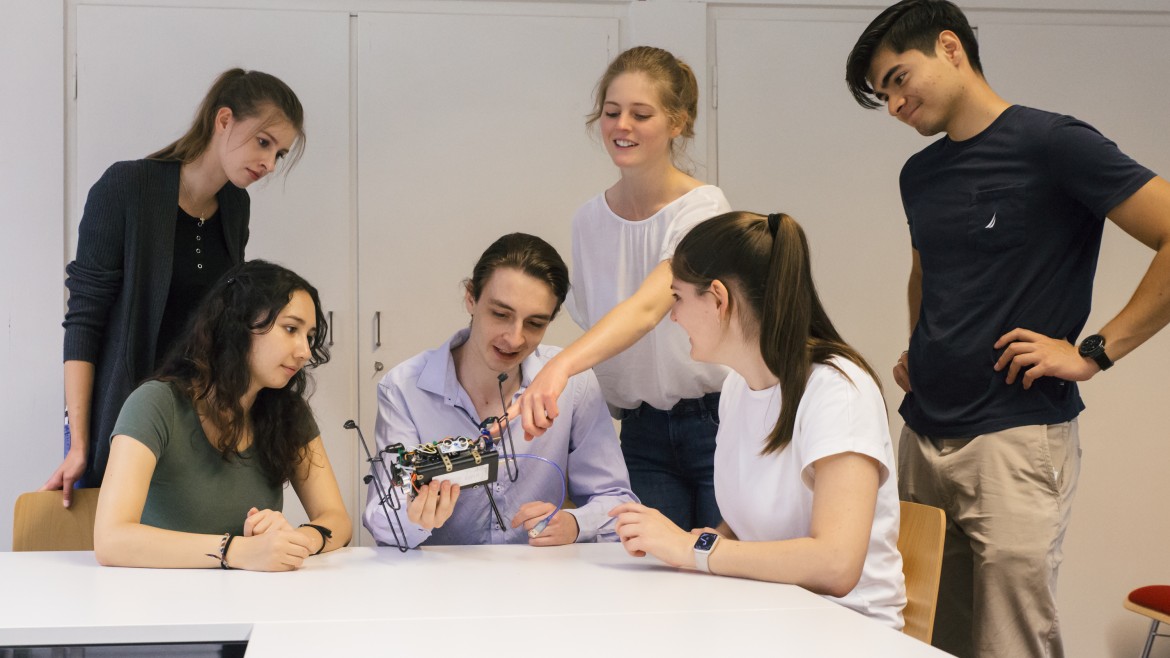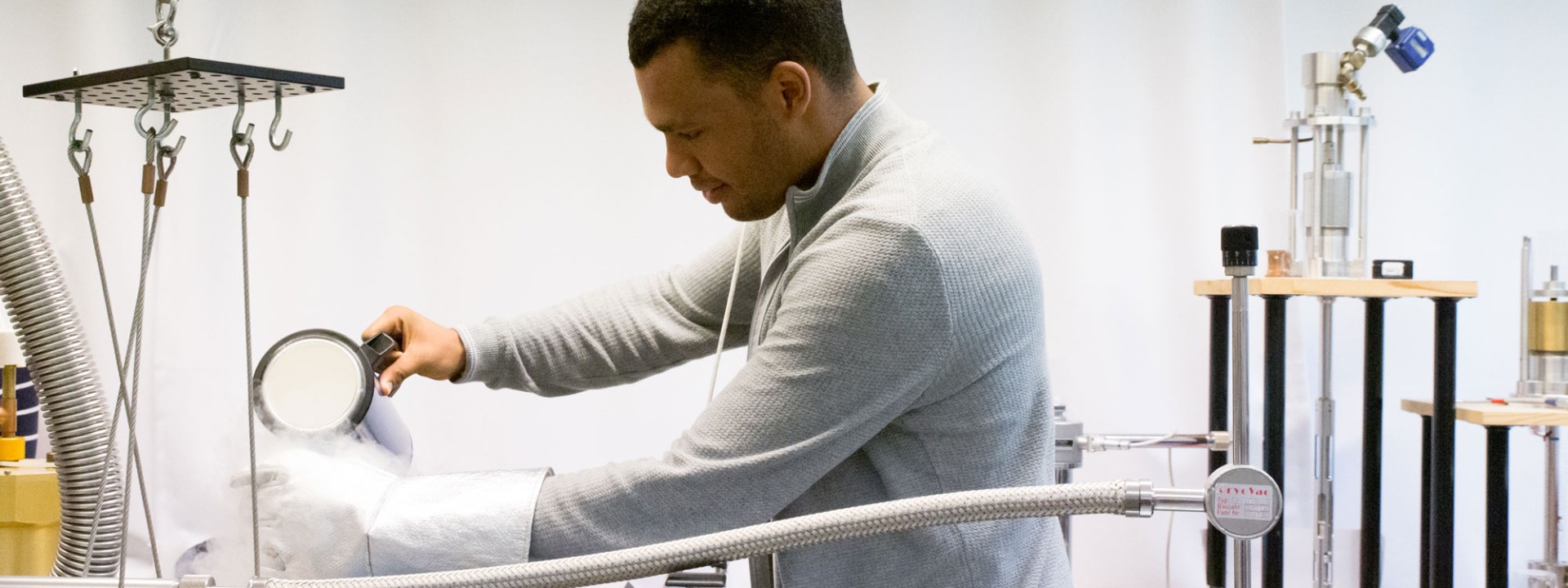Details of the Major Course
With the specializations in the 6th and 7th semesters, you can set individual emphases in the bachelor's program in technical physics according to your personal preferences.

In the 6th and 7th semester six elective modules have to be chosen. You can choose any of the offered modules.
However, the program offers specializations that correspond to major application areas in industry and can be deepend in the Department's Master Degree Programs in Micro- and Nanotechnology , Photonics , Mechatronics and the Master Applied Research in Engineering Sciences .
Microtechnology deals with the design and manufacture of microsystems technology products such as microsensors and actuators - smartphones already have a double-digit number. Semiconductor technology is concerned with the design and manufacture of products based on semiconductor materials, such as integrated circuits - enabling digitization - and photovoltaic conversion of the energy transition.
All of these techniques can be applied and developed in modern, advanced products and research only with knowledge of the physical fundamentals. The following elective modules are offered in the study program:
| Micro / Semiconductor technology |
|---|
| Semiconductor / Thin Film Technology |
| Microsensors / Actuators |
| Applied Electronics |
| Vacuum / Cryogenics |
Examples of Companies and Instituts
Bachelor theses that fits this specialization have been and are being prepared, for example:
Infineon, Osram, Siemens, Bosch, Texas Instruments, Airbus Group, TDK / EPCOS, Ketek, Intel, ASM Assembly Systems, slip ring, Wacker, Heidenhaim, CGS GmbH, Rohde & Schwarz, EOS, National Instruments, Hilti, OCE, nanotools, Prüftechnik Alignment Systems, MicroNova, ATV Technology, Nanotemper, Webasto, EagleBurgmann, Nextnano, Fraunhofer, Max Planck Society, LMU, TUM, Laboratories of Munich University of Applied Sciences.
This specialization in Micro- / Semiconductor Technology will be continued in the Master's program Micro- and Nanotechnology and can be further developed there. However, there are also opportunities in the Master Photonics and Master Mechatronics / Precision Engineering.
Optical technology deals with the use of high-precision lasers in metrology, materials processing and medical technology, gigabit information transmission and the design of energy-efficient, flexible lighting. The acoustic technique deals with the design of technical systems for noise protection (environmental protection) as well as the improvement of sound propagation.
The common basis of optics and acoustics is propagation as a wave. The countless applications in technology and research (such as the engine sound in the interior of a car) can only be applied and developed with knowledge of the physical fundamentals. The following elective modules are offered in the study program:
| Optical / Acoustic Technique |
|---|
| Optoelectronics |
| Laser Technology |
| Engineering Acoustics |
Examples of Companies and Instituts
Bachelor theses that fits this specialization have been and are being prepared, for example:
TOPTICA PHOTONICS AG, Laser Components, InnoLas, Menlo Systems, ROFIN-BAASEL Laser Technology, IFCO, Trumpf Scientific Lasers, Müller-BBM, MTU, Smart Move, Kayser-Threde, Gigahertz Optics, Carl Zeiss, HIGH Q LASER, MLASE AG, DLR , Max Planck Society, LMU, TUM, Laboratories of the University of Applied Sciences Munich.
This specialization in Optical / Acoustic Engineering will be continued in the master's program in Photonics and can be further developed there. However, there are also opportunities in the Master of Micro and Nanotechnology and in the Master of Mechatronics.
Energy and Environmental Engineering has an interdisciplinary approach to all engineering courses and is extremely forward-looking. This specialization in Engineering Physics is aimed at high technologies that require substantial physical fundamentals for further development.
| Energy / environmental technology |
|---|
| Regenerative Energy Technology |
| Heat and Mass Transfer |
| Power Electronics |
| Nuclear Measurement / Radiation Protection |
Examples of Companies and Instituts
Bachelor theses that fits this specialization have been and are being prepared, for example:
BMW Group, Bosch, General Electric, Elcore, Fraunhofer ISE, Elcomax, Exaphi, GP Inspect, Bertrandt, Photovoltaic Institute Berlin, Research Center for Energy Economics, Fraunhofer Gesellschaft, ZAE Bayern, Helmholtz Zentrum, TUM, Laboratories of Munich University of Applied Sciences.
This specialization in Energy / Environmental Technology can be continued and deepened in the Master's program in Micro- and Nanotechnology, but also in the Master Photonics and in the Master Mechatronics / Precision Engineering. With the research master Applied Research in Engineering Sciences a deepening in further fields of study within an applied research project can take place.
One of the six elective elective modules you have chosen can also be completed with a project work. Such project work can then be internationally recognized as a bachelor's research project. For further information, please refer to the study and examination regulations.
Interdisciplinary focus in the course of study in Engineering Physics is the Physical Modeling for computer simulations.
Starting with the fundamental studies in the respective lab classes, preparatory courses already include practical training in common industry standard software as well as relevant programming languages (C ++, C # or Java), mathematics (Maple or Mathematica), signal processing and device control (Labview) and CAD- Applications (Solid Edge).
| Modeling and Simulation |
|---|
| Modeling / MATLAB / Simulink (compulsory module in the 4th semester) |
| Numerical Physics / Simulation (elective module in the 6th or 7th semester) |
The main focus on physical modeling and simulation is supported by a corresponding range of elective courses in all master programs. He also plays an increasingly important role in university research activities (see, for example, Mosilab ).
